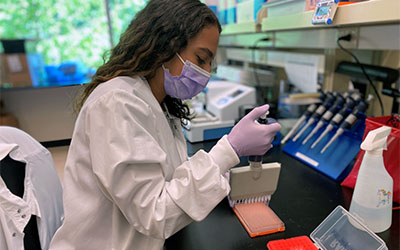Coler Lab Contributes to First-Ever TB Vaccine Human Challenge Study
Published

Seattle Children’s Research Institute’s Coler Lab, part of the Center for Global Infectious Disease Research, is partnering with The Jenner Institute at the University of Oxford in a landmark clinical study testing the effectiveness of a subunit tuberculosis (TB) vaccine in a first-ever aerosol mycobacterial challenge infection model with healthy adult volunteers.
The clinical trial, TB045, began enrolling participants in January at Oxford. Samples from the 48 study participants will be sent to Seattle Children’s for transcriptomics, ELISAs and flow cytometry efforts by the Coler Lab, which is part of the Immune Mechanisms of Protection Against Mycobacterium tuberculosis Centers (IMPAc-TB) program. IMPAc-TB is a National Institute of Allergy and Infectious Diseases (NIAID) initiative to better understand TB immunology and to guide the design and development of new and improved TB vaccines.
TB is caused by the bacterium Mycobacterium tuberculosis and is a leading cause of infectious disease deaths globally. The only current licensed TB vaccine is Bacillus Calmette-Guérin (BCG), which has remained unchanged for over a century. BCG is a weakened form of Mycobacterium bovis, which is very similar to Mycobacterium tuberculosis and is normally given as an injection at birth in areas with endemic TB. Although BCG is safe to give to infants, it does not provide lifelong protection, and drugs against TB are not enough to stop the financial and social burdens of the disease. An effective vaccine is urgently needed to reduce the spread of infection, prevent progression to active disease and save lives.
A new TB vaccine, ID93+GLA-SE, has been developed. It has recently undergone clinical trials to show that it can be given safely to healthy people. However, it is not easy to determine which TB vaccines will work well and which will not. In vaccine studies against other diseases, such as influenza and malaria, it is possible to experimentally infect volunteers to see if the vaccine being studied is effective. Challenge studies are possible when the disease being studied is self-limiting or where safe, effective and short treatment regimens exist. This is not the case with TB, which requires a minimum of six months of treatment with multiple medications.
 Dr. Rhea Coler
Dr. Rhea ColerThe Jenner Institute has developed a TB vaccine “challenge model”: Aerosolized BCG vaccine is given as a mycobacterial challenge, a mimic for Mycobacterium tuberculosis infection. The BCG vaccine contains bacteria which are still alive but weakened, so they do not cause disease in healthy individuals. As the BCG and TB bacteria are similar, studying how the body’s immune system responds to and fights off BCG may yield important information about how well this new TB vaccine might work. The researchers hope to understand more about the body’s immune response to the new candidate subunit vaccine and to show the safety and utility of the inhaled BCG “challenge” to study new vaccines, the first of its kind for TB.
In the study, half of the volunteers will receive the new TB vaccine and the others will receive no vaccine. All of the study participants will then be challenged with BCG to assess whether the new vaccine is safe, generates an immune response and protects against aerosol mycobacterial challenge. The volunteers will have a medical procedure to obtain samples from their lungs 14 days after their challenge infection to see if BCG remains in the airways.
“This is a very exciting study and the first time an aerosol BCG-challenge model will be used to test a new subunit TB vaccine,” said Rhea Coler, MSc, PhD, who is leading Seattle Children’s contributions to the TB045 study. The study is funded by the National Institutes of Health.
— Colleen Steelquist
